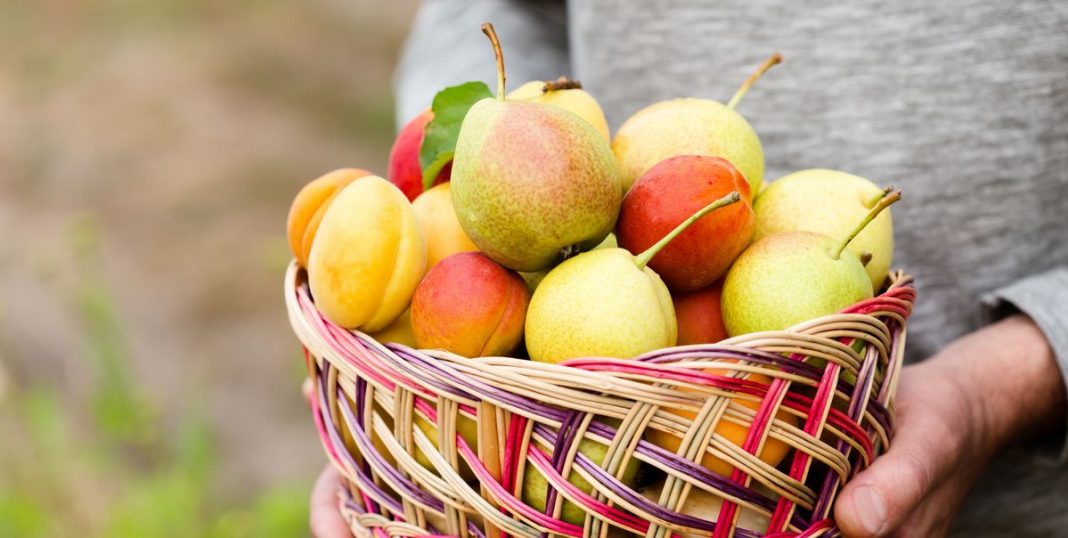When you think of protein, fruit doesn’t usually come to mind.
“The best sources of protein include chicken, fish, seafood, turkey, tofu, Greek yogurt, beans, lentils, cottage cheese, and eggs,” says Melissa Majumdar, M.S., R.D., senior bariatric dietician at Brigham and Women’s Hospital in Boston and spokesperson for the Academy of Nutrition and Dietetics. “Other foods that are good sources of protein include nuts and seeds, nut butter, cheese and milk, and green peas and edamame.”
Not a single fruit makes that list, and that’s largely because fruit doesn’t meet the requirements.
“To be considered a good source of protein, one serving should have over 6 grams of protein,” says Majumdar. “Whole grains, fruits, and vegetables will offer a few grams of protein each, but they are often not complete sources of protein and provide us with more macronutrients (fat, carbohdyrates) than protein.” Unless you’re eating pounds of it, fruit comes in well below that amount per serving and won’t help you build muscle on a plant-based diet.
Fruit does provide some protein, but it won’t make a huge dent. Mostly, what you’re getting is carbs, says Majumdar: “On average, fruit provides about 15 grams of total carbohydrates from natural sources of sugar like fructose and glucose and fibre in a 1/2 cup serving.”
But just because fruit contains carbohydrates and (gasp!) sugar, doesn’t mean that you should avoid fruit. It’s just that you shouldn’t house fruit as a way of trying to consume more protein. In short, eating fruit alone won’t help you build muscle.
That said, the carbohydrates in fruit are valuable for aiding protein synthesis. “Foods that provide carbohydrates, like many fruits, give us energy and fibre that allows our body to spare the protein for muscle growth, repair, and formation,” says Majumdar.
And fibre is especially important for a healthy diet overall. The nutrient can contribute to greater fullness within a meal (nutrition experts call this “satisfaction”) and for feeling fuller longer after a meal (what’s called “satiety”). Plus, science has shown that people who eat high-fibre diets tend to have less risk of heart disease.
The 8 foods that follow are some of the fruits with the highest concentrations of protein. But, again, the amounts are paltry compared to the say, six grams of protein in a single egg.
But, yes, fill up on fruit—and these fruits, specifically, if you could use a little change-up to your traditional apples and bananas. Just don’t do it only for the protein.
1
Jackfruit
Protein: 1.42 grams per 1/2 cup serving
This trendy fruit has made headlines as a popular meat substitute. “Jackfruit is high in vitamin B6, a nutrient required for the metabolism of protein,” says Majumdar.
Take note, though: While jackfruit is used in place of meat because of its texture, it is not a protein replacement in itself. Rely on jackfruit for its flavour and texture, but not as a source of protein,” says Majumdar.
2
Prunes
Protein: 0.95 grams per 1/4 cup serving
Dried plums have a little protein per serving. But, as you likely know, they’re better known for their fibre content. So you should definitely be careful with them when it comes to serving size and your digestive system. Unless you’re constipated, overdoing it on the prunes could potentially send you running to the bathroom all day.
3
Dried cherries
Protein: 1 gram per 1/4 cup serving
A 2018 review of the nutritional value of cherries found that they helped reduce inflammation and arthritis, as well as improving quality of sleep. Plus, tart cherry juice has also been found to be an excellent relief aid for sore muscles.
4
Guava
Protein: 2.11 grams per 1/2 cup servingFor fresh fruit, guava has the upper hand on protein content. It also has been found to be an excellent source of fibre and has loads of antioxidants. “Use guava to sweeten a smoothie alongside another source of protein, like protein powder, Greek yogurt, or cottage cheese,” says Majumdar.
5
Golden raisins
Protein: 1.35 grams per 1/2 cup (packed)
“Raisins are a good vegetarian source of iron and provide fibre and potassium,” says Majumdar. They’ve also been found to help stave off junk food cravings. Use raisins to sweeten cereal instead of buying cereal high in sugar, or to top off peanut butter on celery or toast.
6
Avocado
Protein: 3 grams per 1 cup (cubes)
Yes, an avocado is a fruit. Another surprising fact: The same amount of avocado (1 cup of cubes) has a whopping 10 grams of fibre. Is there anything avocado can’t do?
7
Kiwi
Protein: 2.05 grams per 1 cup (sliced)
These bright-green seeded fruits lend a little protein to fruit salads, but are also great halved and with the pulp scooped out with a spoon. Easy.
Emily Shiffer
Emily Shiffer is a former digital web producer for Men’s Health and Prevention, and is currently a freelancer writer specializing in health, weight loss, and fitness.
Paul Kita
Paul is the Food & Nutrition Editor of Men’s Health.
This content is created and maintained by a third party, and imported onto this page to help users provide their email addresses. You may be able to find more information about this and similar content at piano.io
